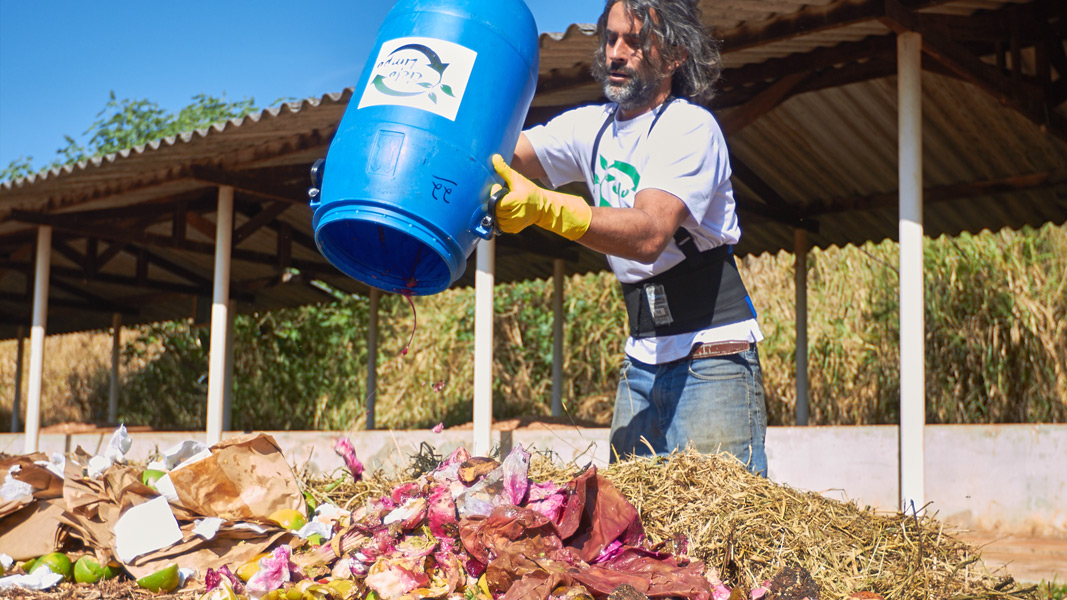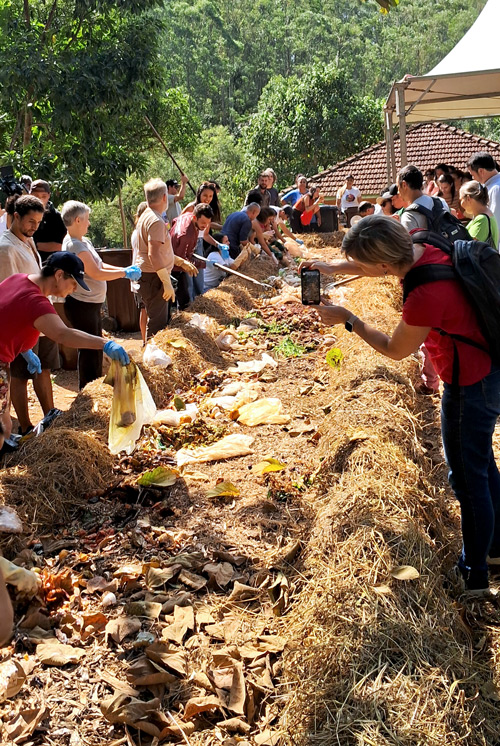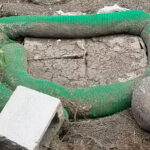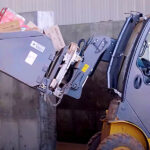Top: “Arm-windrows” being built at the Ciclo Limpo composting facility owned by Julio Pinhel, one of the founding members of the Brazilian Composting Association.
Ana Carvalho
In 2022, after several years of meetings, virtual conversations and education and outreach initiatives, a group of composters from community gardens to small- and medium-scale composting facilities, organics diversion educators, activists, agronomists, and haulers, decided to create the Brazilian Composting Association (Associaçāo Brasileira de Compostagem – ABC). “The ABC’s three main pillars are market, government policies and incentives, and community education and outreach,” explains Felipe Pedrazzi, a biologist who is owner of Faz Verde Soluções Ambientais (Do Green Environmental Solutions), and the association’s current president. “Our goals are to strengthen the composting sector and promote it as the main solution for organic waste management, enhance the market, promote civil awareness about the topic, and have a seat at the government table when it comes to policies related to organics diversion as a sustainable future for the country.”
In its first two years, ABC has been focused on promoting the association, and working with community groups, city administrations, private schools, and the residential and commercial sectors. The association has 70 official members from 12 different states (Brazil has a total of 26 states), most of who process between 5 to 15 tons/month of organics. The majority are from the high-density south and southeast regions of Brazil, where the states of Rio de Janeiro and Sao Paulo are located. ABC does not have accurate information on organics diverted and collection and processing infrastructure in Brazil. Most of the composting facilities are small, with minimal equipment, some using what they call “arm-windrows” — building and rotating windrows using shovels.
Getting Established
ABC’s Government Affairs Committee reached out to Brazil’s Environmental Ministry to inform the agency about the organization, its goals, interests and ability to assist the government with its waste management policies. As a result, ABC is working with the federal government to include composting as organics recycling in the country’s waste management legislation, the Rovamet Law, which initially only included waste and recycling commodities management. In addition, EMBRAPA (Brazilian Association of Agro Technology), is currently interested in joining ABC.
Julio Pinhel, a biologist and owner of the Ciclo Limpo composting facility, serves as Senior Financial Administrator for ABC. He explains that members pay annual dues to help cover the costs of educational and outreach materials such as blogs, articles, web presentations, and a member newsletter, and a communication professional, who helps organize and promote the annual Semana de Compostagem (National Compost Week), an event open to the public, which drew 300 participants in 2024. Budget is allotted to pay members’ expenses to participate in government discussions about organic waste diversion mandates, logistics and technologies, as well for board members to attend important related events. “ABC has a strong belief that composting is one of the most accessible tools to help in the fight against climate change, reorganization of the economy, and regeneration of the environment through natural resources,” notes Pinhel.
ABC’s Science and Technology Committee is responsible for evaluating and approving thermophilic composting methods in windrows and aerated static piles. Thiago Cacuro, founder of Smart Compost, is director of the Committee. He and Pedrazzi are members of the US Composting Council and stay abreast of current research. Pedrazzi is conducting odor emissions research with the FAFESP (State of Sao Paulo Government Foundation in Support of Research).
Confronting Challenges
Incinerators are a significant obstacle to the success of the composting efforts in Brazil. “Brazil does not have a ban on incinerators, and the industry now, to avoid that label, is calling itself terms like waste to energy, co-processing, thermo-capturing, and pyrolysis, confusing the decision makers,” notes Cacuro. “Another obstacle is the market for the end product. Most farmers compost on-site, and use the product either as an organic fertilizer or for animal bedding.”
Another critical difficulty Brazilian composters face is the lack of financial incentives. Unfortunately, landfills are still less expensive to operate than composting facilities, competing with efforts to encourage more participants to properly divert their organic waste. The association has a proposal for a fiscal incentive to generators, allowing them to deduct 6% of their owed taxes and donate those funds to recycling co-ops and waste diversion organizations that are registered with the federal government and have approved projects.
Composting Companies
Planta Feliz Adubo (Happy Plant Organic Fertilizer), one of ABC’s founding members, is the first private composting facility located on the outskirts of the city of Sao Paulo. The company recently received a permit to process 10 tons/day of food waste. Until now, it had been operating with a maximum of about a half-ton/day, processing via “arm-windrows,” with an average input of 300 tons/month, and an output of approximately 90 tons/month of compost. Planta Feliz Adubo collects source separated organics from private schools, businesses, social clubs, and homes. It also offers drop-off at its composting site for people who want to bring food waste to the facility. “The City of São Paulo has five municipal composting facilities which only serve 17% of its Farmers Markets,” explain Marina Sierra Camargo and Adriano Sgarbi, owners of Planta Feliz Adubo. “Overall, only 0.5% of the city’s organic waste is composted, and approximately 18,000 tons/day of organic waste goes to landfills.”
Compost products are sold to construction material stores, organic agriculture growers, and conventional farmers. Current clients receive a 25% discount on product purchases. As part of its educational and outreach program, Planta Feliz Adubo donates compost to community gardens and tree planting initiatives. Community members are invited to take facility tours and participate in workshops to learn about composting, e.g., to help build a windrow. The company also provides a report to its customers about their diversion data and environmental impact.
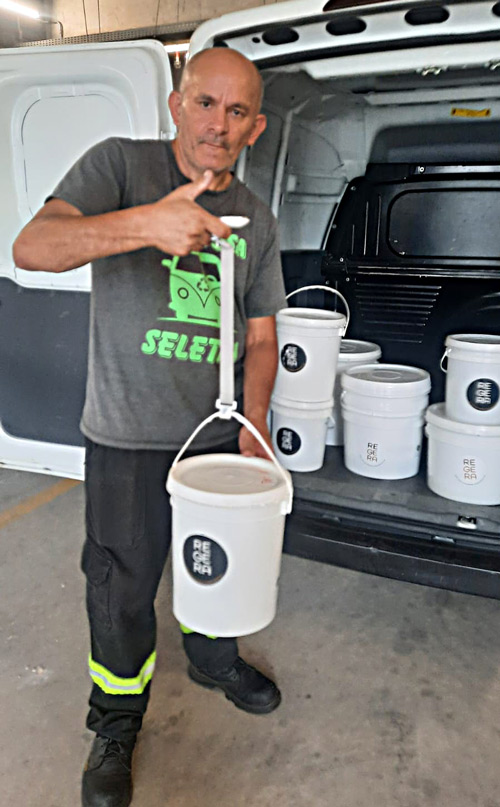
Regera Mundo (World Regeneration) staff weighing organics collected in a 5-gal bucket with lid and signage, and an ABC’s approved compostable bag.
Felipe G. Tomasi, also a founding member of ABC, is CEO of Regera Mundo (World Regeneration), a waste collection company that “strives for changes in urban waste management and sustainable practices, collecting food and yard waste and residential plants.” The company services single family homes, multi-family residences, private schools, shopping centers, businesses, restaurants and small events. Households receive a 5-gallon bucket with a lid and signage, along with an ABC-approved compostable bag. Staff are trained to inspect sorted materials for contamination and weigh the buckets prior to collection. They log the volume and weight on the participant’s account.
Frequency of collection varies with type of generators. In general, Regera Mundo collects once a week from residential, and up to three times a week from commercial generators, such as schools and shopping malls. Multi-family residents bring their buckets to a central collection area within the complex. According to Tomasi, the most common multi-family contaminants are diapers, bathroom waste and cat litter. Collected organics are transported to different composting facilities within an approximate 20-mile radius from the generator, which sometimes can be very limiting when it comes to providing services. To mitigate this limitation, Regera Mundo provides drop-off collection sites for residents.
The company provides recommendations on collection logistics before starting the services based on a quick waste characterization of the materials — trash, commodities, and organics — to assure proper materials management. Regera Mundo generates a monthly report including how many times the site was serviced, quantity of material diverted from the landfill, its environmental impact (e.g., carbon dioxide avoidance from composting the organics), quantity of compost created, and composting facilities where the material was processed (Figure 1). The end product is sold to urban agro-forests (empty lots being reforested), and donated to certain special events. Regera Mundo, as well as Planta Feliz and Ciclo Limpo, provide these monthly reports to participants as a powerful educational tool to illustrate the relevance of their participation in organic diversion programs.
In 2015, Lucas Chiabi, another founding member of ABC, started Ciclo Orgânico to collect and compost residential organics in Rio de Janeiro. Chiabi, an environmental engineer, became involved in composting as part of a research project. In Rio, 52% of the waste stream is food waste, but only about 2% is diverted to composting, which inspired Chiabi to start Ciclo Orgânico. The company services 4,800 families in more than 25 neighborhoods in Rio de Janeiro, along with about 200 businesses. Households are given 5-gallon buckets for their food scraps. “Since 2015, we have already removed more than 7,605 tons of organic waste from landfills, transforming them into more than 2,280 tons of the best quality organic compost and avoiding emissions of more than 5,855 tons of carbon dioxide equivalent,” notes Chiabi, who provided a video link with a company profile to share additional details. “Our composting site has the capacity to mechanically compost more than 300 tons/month of organic waste.” Cargo tricycles, electric cargo rickshaws and a collection truck equipped with a side cart-lifter are used for food scraps collection. Collected organics are transported to the composting site, bulked with carbon amendments and processed in windrows that are turned with a front-end loader. Ciclo Orgânico has 40 full-time employees.
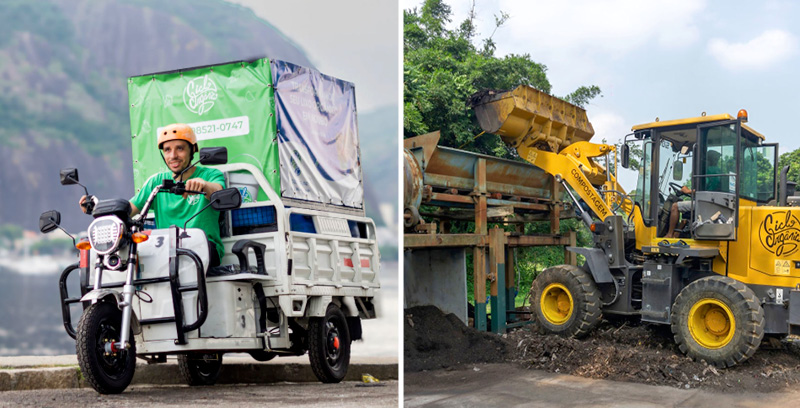
Lucas Chiabi, Ciclo Orgânico founder, driving a cargo tricycle used for collection (left). Screening compost at Ciclo Orgânico (right). Photos courtesy Ciclo Orgânico
Although ABC is still in its beginning, and has outreach yet to do to composters all over the country, it has certainly created a formal presence. Its efforts in influencing public policies and aiding in the creation of proper businesses models for waste diversion, have elevated composting as a viable solution for diverting organic waste. ABC’s Board and founding members are also committed to grassroots education outreach to increase awareness and participation in composting programs.
Ana Carvalho, formerly an Environmental Specialist with the City of San Diego, is a Contributing Writer to BioCycle.


